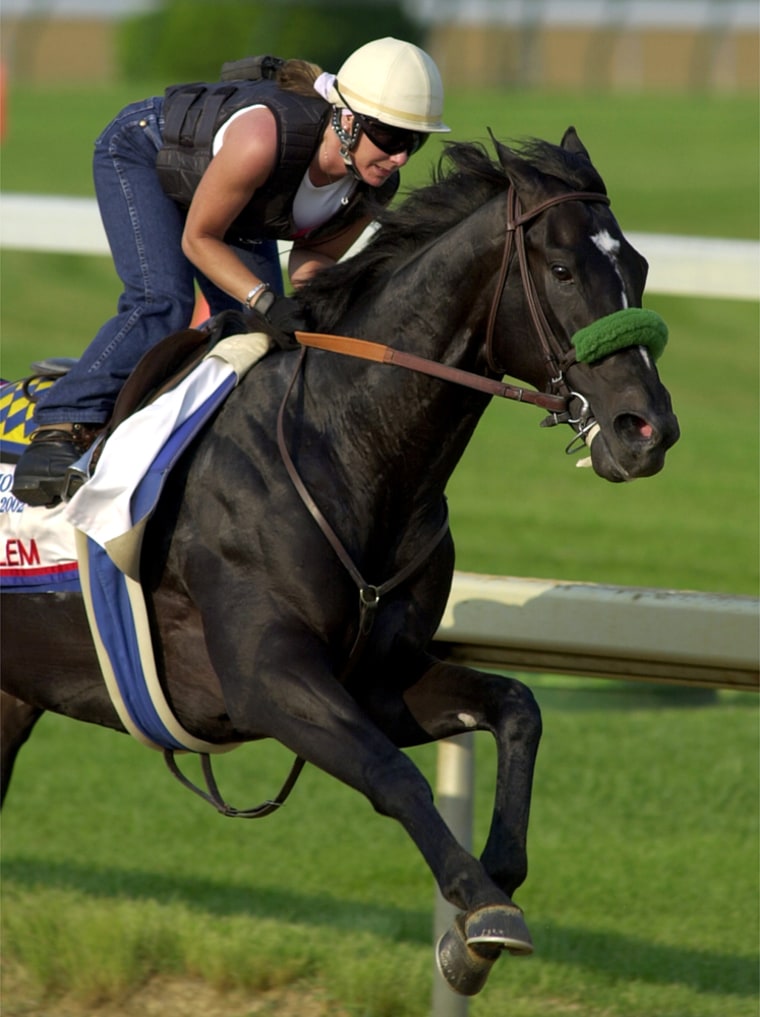During a magnificent spring campaign in 2002, War Emblem, a notoriously headstrong near-black colt, might have been humming "I Did It My Way" to himself in his barn in between consecutive wins in the Illinois Derby, Kentucky Derby and Preakness Stakes. Yet now, after a $17 million sale to Teruya Yoshida's Shadai Farm of Japan in late 2002, War Emblem's relentless non-conformity has caused a big headache for Shadai and the four insurance companies that held policies on the horse's fertility — he won't do it any way.
Mate with mares, that is.
War Emblem, North America's champion three-year-old male of 2002, lives at Shadai Stallion Station on the island of Hokkaido. The intention is for him to have another go at the breeding business this season, which officially begins next month. He spent a summer in limbo while the insurance companies negotiated his case, which is unusual in that the horse's libido rather than fertility was judged sub-normal.
It was reported last year that three insurance companies in Japan paid out claims on War Emblem, effectively becoming owners of the percentage of the horse they insured. But last week Shadai spokesman Eisuke Tokutake declined to comment on who owns War Emblem. "Things are sensitive because they are still under negotiation with the insurance companies," Tokutake said.
However, the fourth company, Lloyd's of London, thought to be the main sticking point in negotiating with Shadai, recently agreed a settlement. An underwriter at Lloyd's said: "It's all been resolved." It is understood that Lloyd's no longer owns any portion of War Emblem.
Lloyd's, which underwrote 37 percent of the horse's insured value through three of its syndicates, had contested the "infertility" basis of the claim. War Emblem did cover seven mares at Shadai last year, and four of them were reported in foal. The problem was that he refused to look at the other 200.
Shadai revealed last year that War Emblem rejected that number of mares of various breeds, sizes and colors; they were proffered to him in a vain attempt to arouse the young stallion's interest. It was also widely reported that there were 350 thoroughbred mares booked for his services in 2003.
That figure is enormous, even by today's standards. For comparison, the most prolific stallion in North America last year, Grand Slam, covered 197 mares.
It's tempting to say, "No wonder War Emblem packed it in!"
The number also suggests a huge financial loss for Shadai — which would have been only partially offset by the insurers. War Emblem's 2003 fee was 8 million yen (about $75,000). Assuming he produced 80 percent live foals (a reasonable assumption from a top-notch outfit), Shadai could have wrung a profit from the horse in his first year alone of more than $21 million.
It would have helped to make up for some hard times at Japan's most successful breeding operation. In the summer of 2002, the farm's promising young stallions End Sweep and El Condor Pasa both died. That blow was followed by the death of Sunday Silence, Japan's champion sire every year since 1995, including posthumously in 2003 when his runners earned close to $78 million.
As for War Emblem, he spent some of his self-enforced leisure in a remote location on the east end of Hokkaido. "He was grazed with mares to recover his sexual desire and interests," Tokutake said.
The stallion's fee has been slashed to 4 million yen (about $38,000), and Tokutake said plans for how many mares he would cover remained uncertain. But when asked if he were optimistic War Emblem would be successful this year, he answered: "We believe so, of course."
It's not surprising. With so much at stake, Shadai must be at least hopeful that somewhere within their dark beast lurks a latent Lothario.
Rachel Pagones is bloodstock editor of Racing Post.
